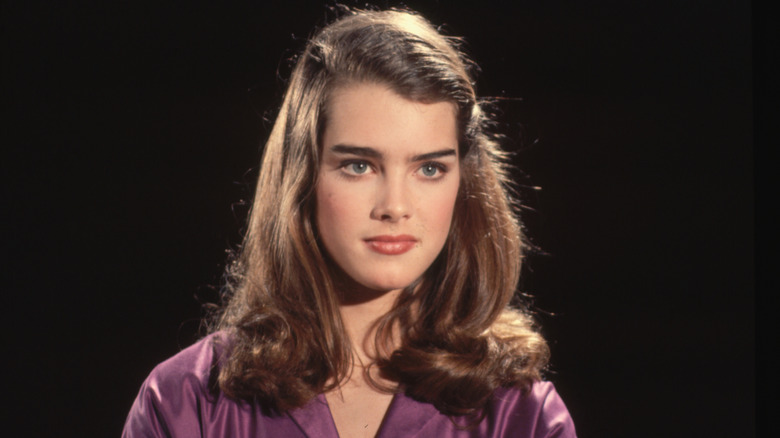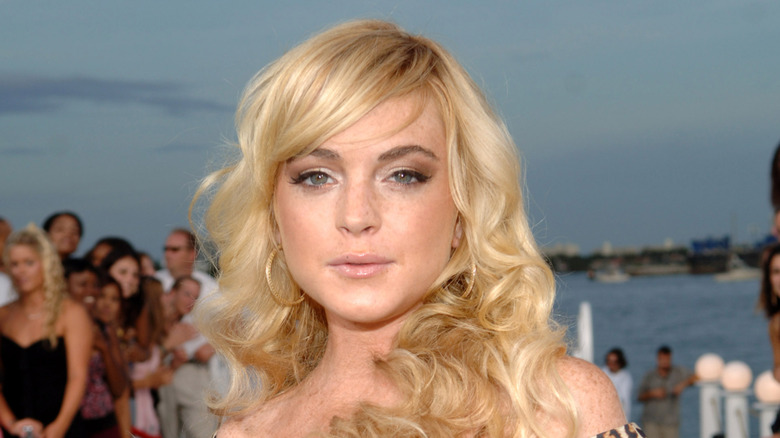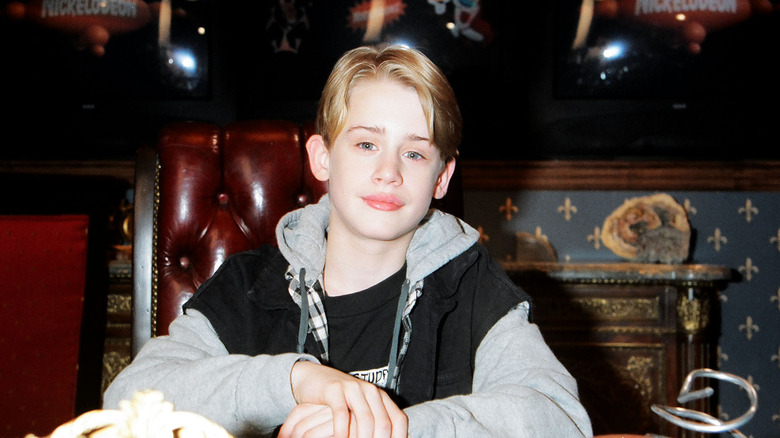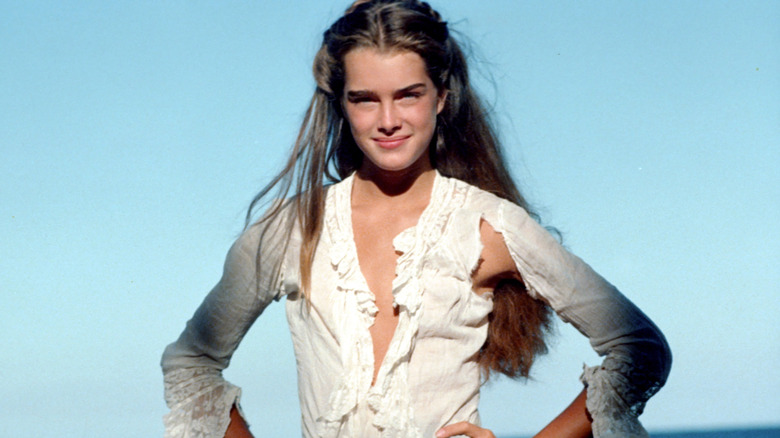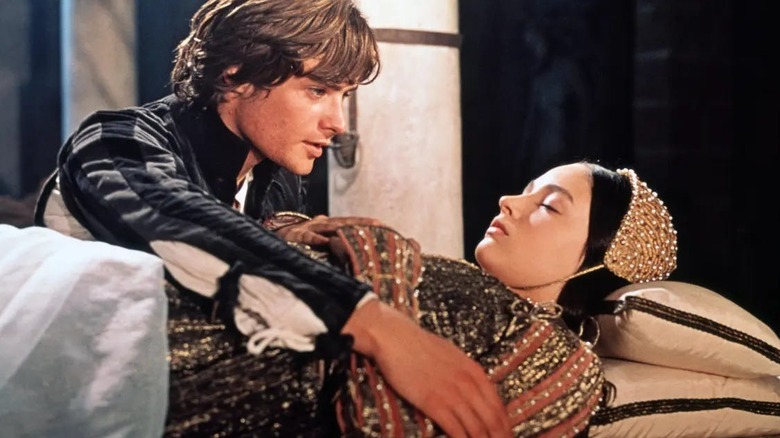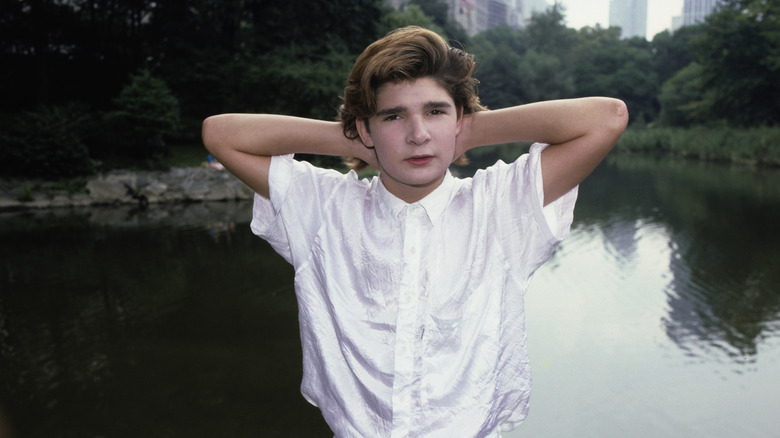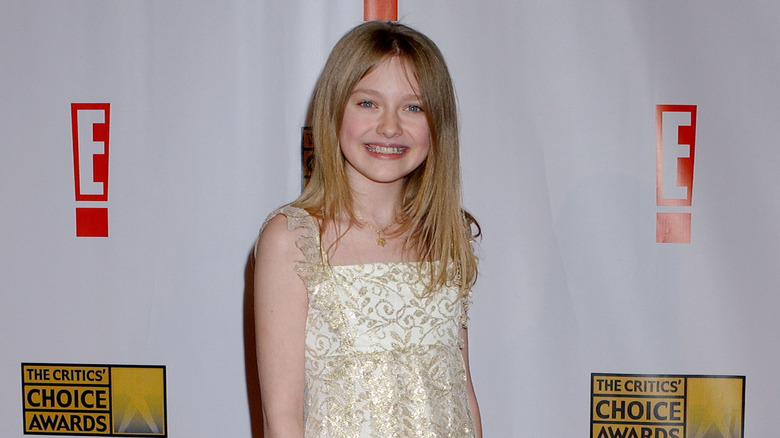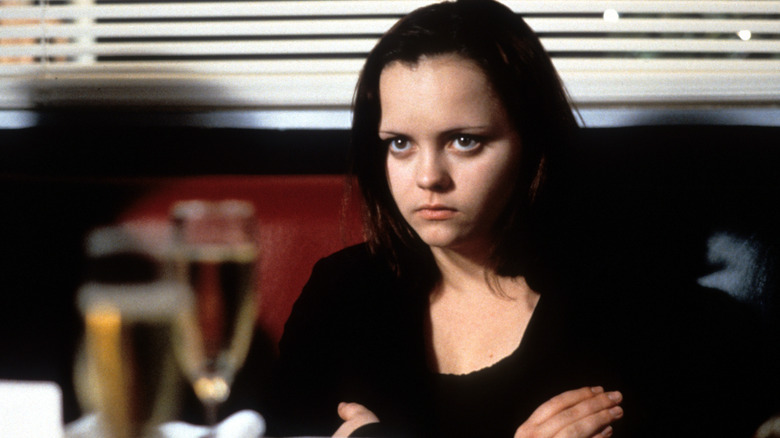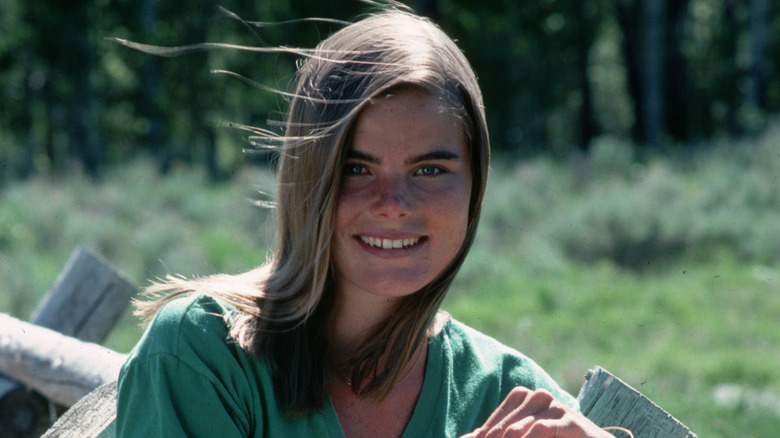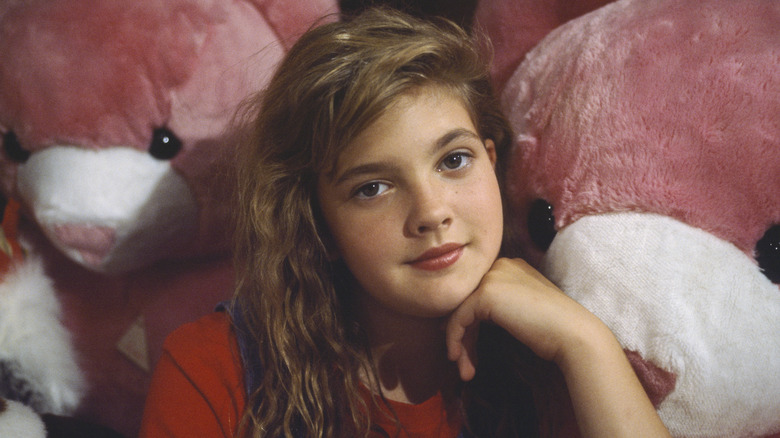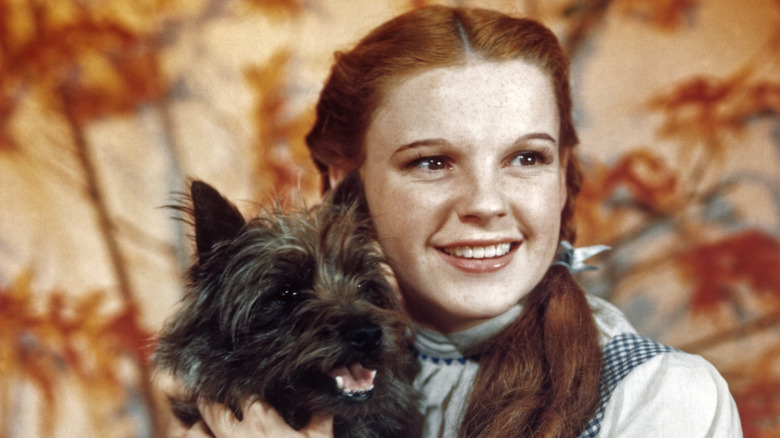The Biggest Child Star Controversies In Movie History
It's become a cliche that child actors will grow up to become addicted to drugs, and for many child actors, this is all too accurate. However, the red-carpet-to-rehab narrative is an oversimplification. Yes, many of these actors end up struggling with addiction, but there is so much more to their stories. These child actors have also faced controlling parents, invasive paparazzi, and even sexual abuse in their young lives.
Some child stars say that filming movies was a positive experience for them, but that they faced intense backlash and criticism for playing a controversial part. Others were forever scarred by the role that made them famous. For many, it took years to get their lives back on track, and some of these celebrities never fully recovered. It's no wonder that some of these former child stars (who now have children of their own) insist they would never want their kids to enter Hollywood at such a young age. As proof, let's unpack the biggest child star controversies in the history of cinema.
Lindsay Lohan
Lindsay Lohan started modeling at the age of three and appeared in her first movie at age 12. In retrospect, this may not have been good for her emotional health. Lohan told Bustle, "They teach you to say 'yes' to everything, and that's not really what life's all about." For one, Lohan was the target of backlash when she shared that she was dating a woman (a DJ named Samantha Ronson). Lohan downplayed their relationship years later, telling The Howard Stern Show they were "more like best friends."
Meanwhile, Lohan's addiction has been well-documented (perhaps too well-documented, since some would argue that the media crossed a line in its obsession with only the most scandalous aspects of Lohan's life). The actress was arrested more than once for DUI charges, and spent multiple times in rehab. Soon her reputation in Hollywood damaged her career. The invasive press coverage became so aggressive that she moved to Dubai (where paparazzi are illegal) in an effort to stay out of the public eye.
Even after taking a break from the spotlight, Lohan still managed to become entangled in controversy. In 2018, she posted a video of herself attempting to help what she assumed was a homeless family. The actress insisted on treating a mother and her children to a night in a hotel, but when they showed no interest in her offer, Lohan began shouting baseless accusations at them. Lohan has also recently attempted a comeback, appearing in multiple romcoms and seemingly more comfortable in the public eye. She is even willing to poke fun at her reputation.
Macaulay Culkin
"Home Alone" star Macaulay Culkin couldn't have had an easy childhood. The actor has described Kit Culkin, his father and manager, as abusive. Macaulay claims that his father (a former child actor himself) may have been jealous of his son's success and tried exerting control over his son in every way he could. Macaulay recalls asking his father if he could take some time off acting and just be a normal kid, which Kit refused. When his parents filed for divorce, Macaulay (who was 16 at the time) had both his parents' names removed from his trust fund so that they could no longer control his finances. Various figures in Hollywood have commented on Culkin's family drama, with some defending Kit and others saying the man took advantage of his son.
Even as an adult, Macaulay Culkin has often been a source of controversy, such as the time he was arrested for drug possession in 2004. And when Michael Jackson was placed on trial for child molestation charges, Culkin testified in Jackson's defense, since he had been friends with Jackson and identified with Jackson as a fellow child star. Culkin even joined a band called Pizza Underground (which performs parodies of classic rock songs that are heavy on pizza-puns). The band was so unpopular that Culkin and his bandmates were booed off the stage. At this point, Hollywood wants nothing to do with this former child star.
Brooke Shields
When 12-year-old Brooke Shields appeared in the 1978 film "Pretty Baby," there was no avoiding the controversy. This drama about a mother (Susan Sarandon) and her daughter (Brooke Shields) in a New Orleans bordello features scenes in which the young girl is auctioned off to brothel clients and kissed by an adult man. People have accused the film of being exploitative or even pornographic, though some of these complaints have been lobbed by folks who never watched it. The movie, which was even banned in certain regions of Canada, immediately catapulted Shields into the spotlight, where she was mobbed by crowds. It certainly didn't help that some interviewers bombarded the young actress with provocative and inappropriate questions.
Despite all the public fuss made about "Pretty Baby," Shields didn't think it was a big deal. Instead, she appreciated how her adult co-star Keith Carradine took great care to make sure she wasn't uncomfortable during the kissing scene and assured her that it wouldn't count as her first kiss. Her mother sheltered her from most of the negative press and taught her how to not let disparaging comments get to her.
Looking back, Shields said she felt safe filming "Pretty Baby." In fact, she said it was far more traumatic for her to film 1976's "Alice, Sweet Alice," which required her to wear prosthetic makeup that made it look as though her face had been burned. (Shields recalled freaking out when she first saw herself in full makeup.) But while filming "Pretty Baby" was a positive experience for Shields, her subsequent stardom and sex-symbol status after "Pretty Baby" was far more damaging.
Olivia Hussey and Leonard Whiting
Franco Zeffirelli's 1968 movie "Romeo and Juliet" contains a controversial scene that would not be okay to film today: a nude scene involving 15-year-old Olivia Hussey and 16-year-old Leonard Whiting — both minors.
After Zeffirelli's death, Hussey and Whiting filed a lawsuit claiming that the director exploited them and caused them emotional distress. According to the suit, the director reportedly misled the teenage actors to coerce them into filming the nude scene, originally telling them they would be wearing flesh-colored undergarments. Later he went back on that promise and asked the actors to strip down and wear only body makeup. He also claimed that the camera would be placed at an angle so that viewers would not see any nudity, yet Hussey's breasts and Whiting's buttocks were shown in the final scene.
Defenders of Zeffirelli (including his son Pippo) have claimed that both Hussey and Whiting only became famous thanks to Zeffirelli; Pippo accused them of enjoying successful careers for decades before finally voicing their concerns about the nude scene. However, Hussey — who passed away in 2024 — pointed out that she and Whiting were paid only £1,500 (or the equivalent of $2,200) for participating in the movie (which made $38 million at the box office), and that their acting careers didn't get very far after "Romeo and Juliet." "It wasn't something I ever agreed to do," Hussey told Variety. "I just did it because I felt like I couldn't say no."
Corey Feldman
You might recognize Corey Feldman as Mouth from "The Goonies" or Teddy from "Stand By Me." But you may not know that he was sexually abused as a teenager. Years after starring in those movies, Feldman has shared his story as a survivor of sexual abuse — as well as the story of his fellow child actor, the late Corey Haim. Feldman says both of them were raped by powerful people in Hollywood. As an adult, this former child star has blasted Hollywood for its lack of protections for child stars. Feldman has called for changing the statute of limitations for survivors of childhood sexual abuse to give them an opportunity to pursue justice.
Like Macaulay Culkin, Feldman was close friends with Michael Jackson, and has made comments defending Jackson in the wake of sexual abuse allegations against the music artist. This controversy may have damaged Feldman's image as a crusader for fellow abuse survivors. Feldman later clarified in an interview with HLN that he wasn't challenging the allegations, merely shocked to hear this news about his former friend because Jackson was a "big brother figure" to him and had never hurt him personally.
The "Goonies" actor concluded that he could no longer defend Jackson, telling CNN, "As a survivor and someone who has been fighting for this to become a focal topic of our society for decades ... I applaud all victims for letting their voices be heard and I encourage the public debate to continue."
Dakota Fanning
Hollywood has been casting child actors in mature movie roles for decades. Still, when 12-year-old Dakota Fanning portrayed a young girl who is raped in the film "Hounddog," that made a lot of folks mad. In fact, the controversy over the rape scene overshadowed the movie itself. The scene in question involved no nudity, just a close-up of Fanning's face, and Fanning was fully clothed when she shot it. However, that didn't stop some people from accusing the filmmakers of exploiting children.
Paul Peterson, an advocate for child actors, insisted that 12 was far too young an age to film a scene like that. Meanwhile, religious groups signed petitions to jail Fanning's mother and prosecute the filmmakers under child pornography laws. The director even received death threats. Fanning said the accusations were outrageous: "It's not a rape movie," she told Today. "That's not even the point of the film." She emphasized that there was far more to her character in "Hounddog" than just the rape scene. "It's just a movie and it's called acting," she explained in an interview with The Telegraph. "I wanted to do the film because I thought it might help one [real-life rape survivor] overcome adversity in their lives."
Fanning said that she felt it was important to raise awareness about rape, while many viewers pointed out that girls Fanning's age were being sexually assaulted in real-life, so teenage girls should certainly be mature enough to discuss this issue (and in Fanning's case, work on a film that explored it). Some of the film's loudest critics never even saw the movie.
Christina Ricci
Best known for playing Wednesday in the 1991 film "The Addams Family," Christina Ricci has been in the spotlight ever since she was young. Like many child actors, Ricci has been the source of plenty of controversy. As a teenager, Ricci turned to drugs and alcohol as a coping mechanism, and has alluded to childhood abuse. She has insisted it was her home life, not stardom, that was traumatizing for her, and that Hollywood was a much-needed escape from her problems at home. Yet despite her experiences as a child star, she would never wish it on her son: Ricci said she won't let him pursue an acting career until he's an adult.
Most notably, Ricci dropped some rather provocative statements during some interviews as a teenager. According to The Telegraph, Ricci once told interviewers, "I'm not afraid to die." Meanwhile, Ricci told Rolling Stone that she once mentioned that she enjoyed reading "Les Enfants Terribles" (a book that involves incest between two siblings), and when one reporter asked her if she liked incest, she gave a sarcastic reply: "Yeah, it's amazing, and really natural, and everyone should have sex with their siblings."
Ricci even showed off burn marks on her arm that she'd given herself with a cigarette, saying she'd done it to impress her co-star. All of these, Ricci claimed, were just jokes, her teenage self posturing for attention. "You make mistakes," she told The Scotsman. "You say things you shouldn't. And you learn not to do it any more."
Mariel Hemingway
Woody Allen's 1979 film "Manhattan" features one of the most uncomfortable age gaps of any movie couple: a romance between a 42-year-old man (Allen) and his 17-year-old student (Mariel Hemingway). Hemingway was 16 years old at the time. In fact, when she shot a kissing scene with Allen in the back of a taxi, Hemingway had never kissed anyone before.
In retrospect, many critics have argued that the film is icky in the way it romanticizes such an inappropriate relationship. In light of the knowledge that Allen married a woman 35 years his junior and allegedly sexually assaulted his seven-year-old adoptive daughter, the dynamic of these two characters from "Manhattan" takes on a whole new meaning.
Looking back, Hemingway has shared that she sensed Allen was infatuated with her, but she brushed it aside because she thought it was normal. More disconcerting was that Allen visited Hemingway's home after the release of "Manhattan" and invited the young actress on a trip to Paris. According to Hemingway's memoir "Out Came the Sun," she began to suspect that Allen intended for the two of them to sleep together in Paris. (Her parents, she noted, seemed to have no problem with this.) When Hemingway confronted Allen about this, he canceled their Paris trip. In spite of everything, Hemingway has still defended Woody Allen as an artist, which has only deepened the controversy.
Drew Barrymore
Drew Barrymore had a tumultuous childhood after "E.T." made her a star. Her mother Jaid let the nine-year-old actress skip school and accompany her mother to parties. Stardom (and its lack of boundaries) kicked off a chain reaction of controversies. By age 14, Drew had already taken cocaine, stolen her mother's credit card, and attempted suicide. Not sure what else to do, Jaid admitted her teenage daughter to a psychiatric ward. At the time, Drew hated her stay in the institution. But in hindsight, she understood why her mother did it. "Maybe it was necessary," she told The Guardian, "because I came out of there a more respecting person."
At age 14, Drew emancipated herself from her mother. However, since Drew was so used to the celebrity lifestyle, she was totally unprepared to survive on her own. As a teenager, her bankability as a child star had dried up, so the actress found herself washing dishes and scrubbing toilets. At age 19, she agreed to pose nude for Playboy, a decision she later regretted. For a time, it looked as though Drew would go the way of most child stars, sinking into addiction and infamy. Instead, she pulled her life together and emerged on the other side.
Looking back, Drew has conflicting feelings about her mother. In some interviews, she insisted it was better that her mother was no longer in her life. More recently, Drew has gotten back in touch with her mother and forgiven Jaid for some of the things she did. However, Drew has hinted that there is still some unresolved trauma from her mother that she needs to unpack.
Judy Garland
While "The Wizard of Oz" is undeniably a classic, the film came at a great cost: Judy Garland was never the same after this role. To stay alert throughout her long workdays on the set, Garland was given "pep pills" by MGM and sometimes even by her own mother. At times Garland would work for 72 hours straight and get only four hours of sleep. What's more, studio execs repeatedly body-shamed her: MGM head Louis B. Mayer kept calling her "my little hunchback." The studio rigidly enforced Garland's diet, both on and off the set. Mayer reportedly hired people to monitor Garland to make sure she was eating only what the studio instructed her to eat. Worst of all, Garland was sexually assaulted by Mayer and other men in the studio.
For the rest of her life, Garland had to deal with the repercussions. Her exposure to pep pills planted the seeds for an addiction problem that would haunt the actor until the end. The media soon became preoccupied with her substance abuse, her four divorces, and her multiple suicide attempts. (At one point John Lennon even made a distasteful joke alluding to Garland's previous attempt to kill herself.) In the public's eye, Garland could never live up to the role that made her famous: in what would become Garland's final show before her death, the audience only heckled her. It's tragic that this former child star's career went out with a whimper.
If you or anyone you know needs help with addiction issues, has been a victim of sexual assault, may be the victim of child abuse, or is struggling or in crisis, contact the relevant resources below:
- Visit the Substance Abuse and Mental Health Services Administration website or contact SAMHSA's National Helpline at 1-800-662-HELP (4357).
- Visit the Rape, Abuse & Incest National Network website or contact RAINN's National Helpline at 1-800-656-HOPE (4673).
- Contact the Childhelp National Child Abuse Hotline at 1-800-4-A-Child (1-800-422-4453) or contact their live chat services.
- Call or text 988 or chat 988lifeline.org
